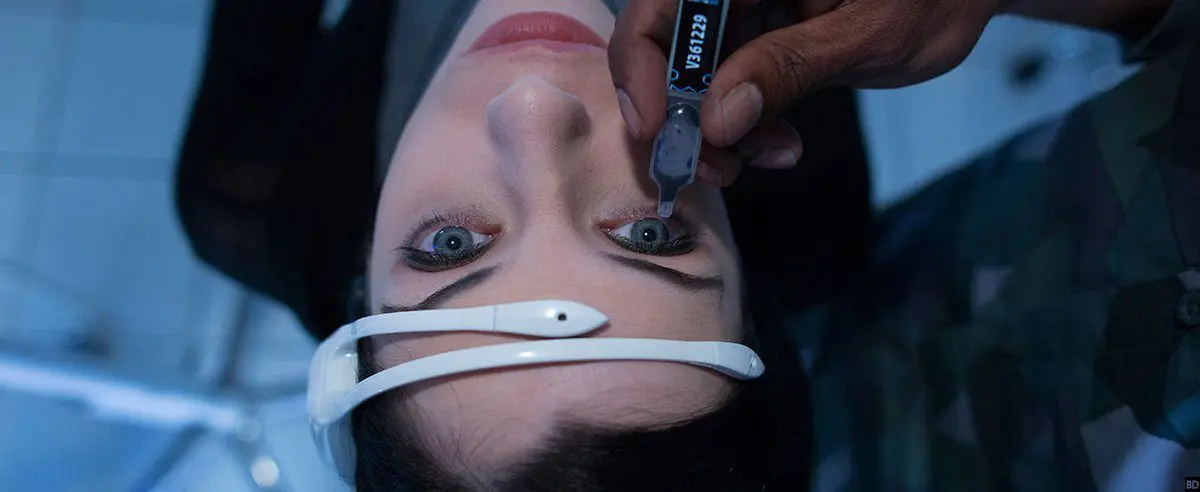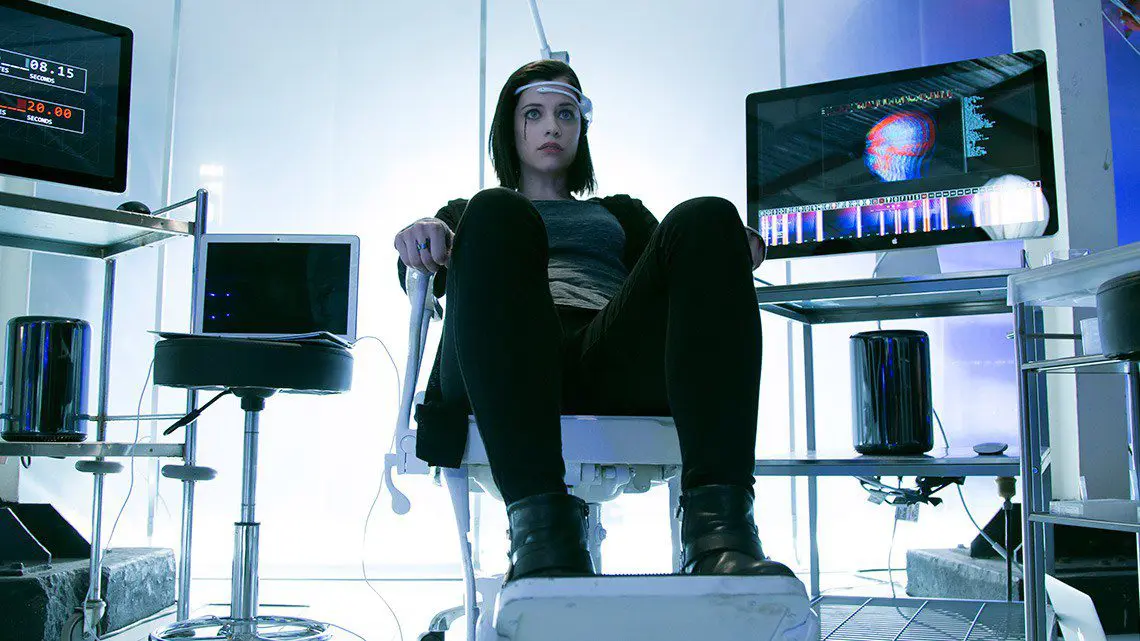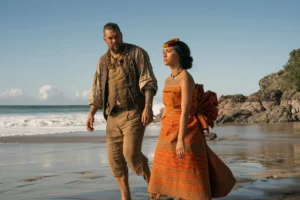Ben C. Lucas brought us an ambitious, flawed bit of pulp sci-fi from the sunny shores of Australia. It’s a rumination on the pitfalls of technology and augmented experience, adapted from Kelley Eskridge’s 2002 novel Solitaire. It has a sense of style and scale that belies the fact that it was shot entirely in Perth on a pocket-money budget.
This is Ben’s sophomore feature. His debut, from 2011, was a promising on-trend cyber-bullying thriller called Wasted on the Young, which had all the hallmarks of a young filmmaker in desperate need of a judicious editor. This film is better-made, and consolidates the promise he showed there with equal ambition but a slightly more reined-in, comprehensible approach. Having said that, though, the reach still exceeds the grasp, and it boasts a look-at-me nonlinear structure that is ultimately hampered by one-too-many late reveals and reversals.
The titular “OtherLife” is a revolutionary bit of “biological software” – an eye-drop that allows users the chance to experience other, more exciting lives through scarily lifelike virtual reality. The gizmo’s inventor, Ren Amari (Jessica De Gouw), is still working out kinks mere days before the thing’s public launch, much to the chagrin of her unscrupulous business partner, Sam (T.J. Power), who’s worried about the company’s stock price.
How you quality-assurance test magic eye-drops is apparently by dumping them into your own peepers and snowboarding down a mountainside to a chalet in the woods. (A lot of what happens in OtherLife is in service to the visuals rather than a cogent narrative.) What’s probably not a good idea is letting your colleague and occasional fuck-buddy, Danny (Thomas Cocquerel), try out an untested sample in your apartment.
With Danny dead, and the entire OtherLife operation in danger of being sunk by bad press, Ren is offered the chance to avoid charges and the ruination of her business by spending a year’s time in her own head. The plan is Sam’s, who has pitched an idea to the Department of Corrections that will revolutionise the prison system. “Hard time without the time,” it’s described as. Ren’s horrified, obviously. She cares less about lucrative joint ventures than she does her comatose brother, who her research might one day be able to revive. But in the absence of better ideas, and in the interest of letting a movie happen, she accepts her punishment.

The obvious comparison is that one episode of Black Mirror in which a couple was driven mad by their unquenchable desire to peer into their spouse’s illicit recollections; the more recent analogue is Rememory, from a bit earlier in the year, which starred Tyrion Lannister as an amateur sleuth combing through memories to solve a murder. Both of those films, though, were about memory, whereas OtherLife, despite pushing similar philosophical buttons, is about imagination.
Its core theme is really that facsimiles of life can’t equate to the real thing; that, say, sailing through the Caribbean over breakfast, or snowboarding through the Alps over lunch, reduces the power of real adventure and experience. Sun-kissed beaches and snow-tipped peaks might look good on a brochure, pitched as laid-back recreational experiences, but they’re still just glossy distractions for the lonely. The worlds constructed by our technology are prisons masquerading as luxury getaways and adventure holidays. Ren’s punishment is just the logical extension of what she’s peddling.
Lucas also brings it together with a lot of tonal consistency; no matter how nutty the film gets in its second half, when we start to revisit the same settings and ideas for new, increasingly-contrived applications, there’s always a sense that OtherLife knows what it is and what it wants to be about, even if it isn’t always entirely successful.
There’s something to be said for that kind of commitment to an idea, especially when an entire team of creative and technical personnel seem to be on the same wavelength. The striking score and sound design is courtesy of Jed Palmer; the resourceful production design belongs to Helen O’Loan. Ren has been outfitted by costume designer Amelia Gebler in standard millennial hacker kit: black boots and eyeliner, jumpers with thumb holes. OtherLife’s ideas and atmosphere are big and bold, but they never extend beyond a point that can be reasonably achieved on a modest budget. It’s a smart move.
There’s a very notable sense that it probably would have been better to trim this scene and that one, and that maybe a line or two could have been rewritten to be less on-the-nose. Typical growing pains. OtherLife is the film equivalent of a talented filmmaker getting dizzy because he stood up too quickly. Once he’s upright he has no problem walking, and maybe even running, but you’ve got to take your time first.
As the plot progressed and I found my excitement in the premise starting to wane, I reminded myself that what OtherLife is, most of all, is practice for a director whose next film will likely tick all the boxes that this one fails to.
I imagine this’ll be the work that, in the future, people point to as the moment Ben C. Lucas transitioned from what he was to whatever he ended up as. It might be worth being able to say that you were there to see it at the time.




